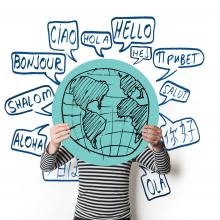
Watch videos of Cochrane groups from different parts of the world who tell us how they contribute to Cochrane in their countries and languages.
Only about 6% of the world’s population are native English speakers, while 75% of people don’t speak English at all.
Many people do not have access to high quality health information, because it is not available in a language that they understand. We translate Cochrane evidence to make it more accessible, and to reduce the linguistic barrier to global evidence-informed health decisions. We have published more than 29,000 translations of Cochrane plain language summaries and abstracts as of November 2019.
Our translation activities are part of our wider knowledge translation programme which aims to ensure that people around the world have access to the health information they need, in the right formats and languages, and to enable people to use our evidence in practice. Cochrane groups in different parts of the world lead our knowledge translation activities in different languages. They translate Cochrane Reviews and related Review content targeted at different audiences, such as podcasts or blogshots. But they also write and disseminate news and other content in their language, do social media, work with professional societies, policy makers, patient groups or the media in their country, and offer training.
Our Cochrane groups who lead multi-language activities share their achievements and challenges in brief videos, and cover topics including volunteer engagement, machine translation, and knowledge translation approaches in their regions and languages.
Cochrane Brazil share how they teach EBM to journalist students and why it’s important.
Cochrane Croatia introduce some of their Cochrane projects including translation of plain language summaries and podcasts into Croatian, evaluation of different presentation formats of Cochrane evidence for different audiences including school children, and their collaboration with the Cochrane Oral Health Group.
Cochrane France tell us about their achievements and challenges in translating and disseminating Cochrane Reviews in French.
Cochrane Russia give an overview of their Cochrane activities, and their translation and dissemination achievements.
View other videos in our multi language series:
- Cochrane Iberoamerica have been translating Cochrane Reviews into Spanish for more than 15 years and tell us how their activities evolved over time
- Cochrane Iran explain how they implement Strategy to 2020 in Iran and present their Persian translation and dissemination activities
- Cochrane Japan introduce their Japanese translation activities and what motivates their volunteers to participate
- Cochrane Korea tell us about the importance and challenges of their Korean translation activities
- Cochrane Malaysia explain how they select and involve volunteers to translate plain language summaries into Malay, what motivates their translators to contribute, and their efforts to evaluate the quality of their Malay translations
- Cochrane Poland explain their plain language summary translation workflow and how they disseminate their translations
- Cochrane Taiwan ran a social media competition and asked their followers to create a video about how they use Cochrane Reviews
- Cochrane Thailand tell us about their history and structure, their training and Thai translation activities
- Beijing University of Chinese Medicine present their Simplified Chinese translation activities and volunteer team
- Automatic translation: Renato Benito, CEO of Nimdzi, talks about the newest developments in automatic translation and interpretation, and how Cochrane these technologies can benefit Cochrane

